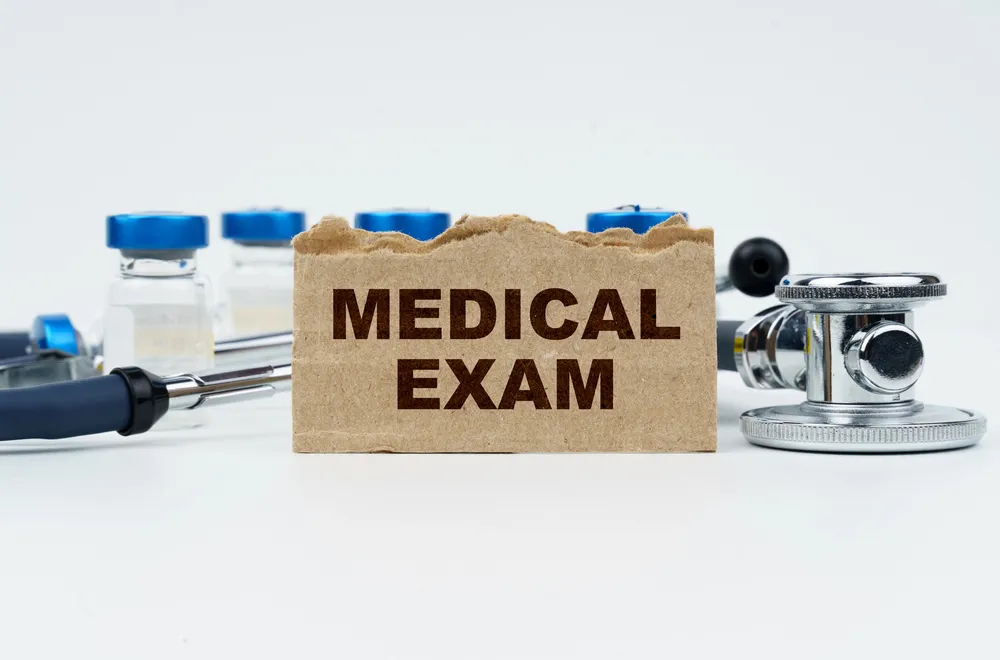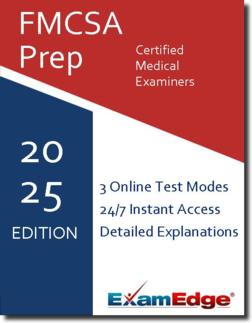FMCSA Certified Medical Examiner Practice Tests & Test Prep - Additional Information
Based on 40 Reviews
- Real Exam Simulation: Timed questions and matching content build comfort for your FMCSA Certified Medical Examiners test day.
- Instant, 24/7 Access: Web-based FMCSA Certified Medical Examiners practice exams with no software needed.
- Clear Explanations: Step-by-step answers and explanations for your FMCSA exam to strengthen understanding.
- Boosted Confidence: Reduces anxiety and improves test-taking skills to ace your FMCSA Certified Medical Examiners (CME).

FMCSA Certified Medical Examiners - Additional Information
FMCSA Certified Medical Examiner Test: Essential Info to Know

If you're in the medical field and looking to branch out into performing health checks for people who drive big rigs and buses between states, the FMCSA-Certified Medical Examiner Test is what you need.
This article breaks down what this test involves, who should consider taking it, and why it's a useful certification to have. Plus, we'll discuss how passing this exam can open new doors for you and why Exam Edge is the best resource to ace medical certification exams.
What Is the FMCSA-Certified Medical Examiner Test?
The FMCSA-Certified Medical Examiner Test—known as the National Registry Medical Examiner Certification Test—is key for medical professionals. It's their entry point to join the National Registry.
This registry is a list of medical examiners who can legally conduct health exams on commercial vehicle drivers. Such examinations are pivotal, ensuring that drivers of trucks and buses are in top health to navigate the roads safely.
Requirements of the National Registry Medical Examiner Certification Test
To ensure the safety of our roads and the health of interstate CMV drivers, the Federal Motor Carrier Safety Administration (FMCSA) requires that medical examiners who conduct physical qualification examinations are certified by a national registry that follows strict standards.
Healthcare Professional Status
First and foremost, to qualify for the FMCSA Certified Medical Examiner test, you must be a healthcare professional. The certification requires you to be licensed, registered, or certified according to the laws and regulations of your state to perform physical exams.
Whether you're a doctor, nurse practitioner, chiropractor, or belong to another healthcare profession, your ability to legally conduct physical examinations is the foundation of this certification.
Registration with the National Registry
Your first step is to register with the National Registry of Certified Medical Examiners (NRCME). When you register, you'll be assigned a unique National Registry number. You’ll need this number to take certification exams and training.
Complete Training
After registration, it's time to hit the books—or, more likely, an online course. You'll need to complete a training program focusing on FMCSA's physical qualification standards. Conducting an exam for drivers that operate 5-ton or more trucks or busses means you need to be aware of certain standards these drivers must pass. After all, driving a 5-ton truck requires drivers to be in top driving physique.
This training is usually taken through private-sector organizations. It covers everything you need to know to assess a driver's health accurately. Often, it will be offered by organizations in your state to ensure you’re up to date on state laws and regulations.
Pass the Certification Test
Having absorbed all that knowledge, the next step is to pass the FMCSA-Certified Medical Examiner Test.
This exam is administered by testing organizations and is the barrier you must cross to earn your certification. It tests your understanding of the health standards and regulations you've learned about, ensuring you're ready to evaluate CMV drivers effectively.
Certification Renewal
Finally, getting certified isn't a one-and-done deal. To maintain your certification, you'll need to complete periodic refresher training and pass re-certification tests.
This ongoing process ensures you stay up-to-date with any changes in standards or regulations, allowing you to continue providing accurate and reliable examinations for CMV drivers.
What To Expect on the Exam Day
Preparation for the exam day starts well before the actual date. Ensure you're registered through the National Registry website and have completed the necessary training. You'll be given a unique identification number upon registering, which you'll need for the exam.
Familiarize yourself with the exam's content and structure through accredited training programs that cover the FMCSA’s physical qualifications regulations and advisory criteria. Don’t forget to take a few FMCSA Medical Examiner practice exams beforehand.
On the Exam Day: What to Bring and Know
On the day of your test, there are several items you need to take your test:
- Identification: Bring at least one form of valid, government-issued ID. This can be your driver’s license, passport, or state-issued photo ID. This is mandatory to verify your identity before taking the test.
- Confirmation Number: Have your registration confirmation or unique identification number ready. This number confirms your eligibility and registration for the exam.
- Know the Location: Double-check the exam center location and have a clear plan to get there on time. Late arrivals may not be admitted into the exam.
- Preparation Materials: Although you cannot bring study materials into the testing room, reviewing your notes or flashcards one last time before entering the center can help refresh your memory.
The Exam Environment
Testing centers are designed to provide a quiet, controlled environment that allows you to focus on your exam. You'll be assigned a station, possibly a computer terminal or a desk for paper-based tests. Prometric offers reasonable testing accommodations if required, but need to be pre-approved. This can include special scheduling, location, software, equipment, or even the use of a personal assistant.
The proctor will explain the rules and procedures before starting. Remember, personal belongings, including electronic devices and watches, are usually not allowed in the testing area.
During the Exam: What to Expect
The exam tests your knowledge of the FMCSA’s physical qualification standards for CMV drivers. Questions cover a wide range of topics, including but not limited to:
- Health Standards: Understanding of the specific health requirements CMV drivers need to meet. Qualification standards cover 13 different areas which relate to driving function.
- Regulations Knowledge: Familiarity with the relevant sections of the Federal Motor Carrier Safety Regulations (FMCSRs), especially Section 391.43(c).
- Medical Advisory Criteria: Ability to apply the medical advisory criteria in evaluating a driver's physical fitness and mental acuity.
After the Exam
If the exam is taken online, with remote monitoring, results may be available that same day. However, official communication regarding your certification status will come from the FMCSA, typically via email.
In Case of Not Passing
If you do not pass the exam, don't be discouraged. Most testing organizations allow candidates to retake the exam after a certain period, usually 30 days. Use this time to review any areas of weakness and prepare more thoroughly for your next attempt.
Why Is FMCSA Certified Medical Examiner Test Necessary?
The National Registry Medical Examiner Certification Test is a cornerstone in maintaining the safety of our roads.
By ensuring that medical examiners are well-versed in the specific health requirements for commercial motor vehicle (CMV) drivers, we can trust that those behind the wheels of big rigs and buses are physically fit to do so
Upholds Professional Standards
This certification test sets a high standard for medical examiners. It’s not enough to be a licensed healthcare professional; you must also demonstrate a deep understanding of the FMCSA physical qualification standards.
This ensures a uniformity of expertise across the board, meaning no matter where a driver goes for their examination, they receive the same quality of assessment. This standardization is crucial for fairness and consistency in the industry.
Facilitates Easier Access for Drivers
For CMV drivers, finding a certified medical examiner is simplified through the National Registry’s searchable database.
This accessibility means drivers can easily comply with the requirement to have their health assessed by a certified professional, no matter where they are in the country. It’s a win-win: drivers can maintain their certification, and the roads stay safer for everyone.
Enhances Public Trust
When drivers and the public know that CMV operators are regularly and rigorously checked for physical fitness, it enhances trust in the transportation industry. This certification test is a key part of building and maintaining that trust.
Knowing that a medical examiner has passed the FMCSA-Certified Medical Examiner Test assures everyone that these professionals have met nationally recognized standards for health and safety evaluations.
How To Pass the FMCSA-Certified Medical Examiner Test
Understand the Exam Structure and Content
Firstly, get to know the exam inside out. The test covers a wide range of topics related to the FMCSA physical qualifications standards and guidelines.
Familiarize yourself with the core curriculum topics required by FMCSA, ensuring your study material covers all these bases.
Register and Prepare Methodically
Register through the National Registry website to get your unique identification number, a crucial step before you can take the certification test. Once registered, dedicate time to complete the necessary training.
Look for training programs accredited by nationally recognized medical profession accrediting organizations. These programs should provide continuing medical education units and include all topics outlined in the FMCSA’s final rule.
Utilize High-Quality Study Materials
Invest in high-quality study materials that are up-to-date with the latest FMCSA regulations and guidelines. This could include textbooks, online courses, and practice tests.
The National Registry website is a valuable resource, offering information on the regulatory requirements for training, including the eight core curriculum topics that must be covered.
Practice with Realistic Exam Simulations
Practice tests are invaluable for understanding the exam format and the types of questions you will encounter. Exam Edge, for instance, offers online practice exams designed to mimic the actual test environment.
These practice exams provide instant access to detailed explanations for each question, helping you understand why answers are correct or incorrect. Taking these exams under timed conditions can also help you improve your time management skills for the actual test day.
Focus on Weak Areas
As you practice, pay special attention to areas where you struggle. Use the results of your practice tests to identify weak points in your knowledge.
Spend additional time studying these areas until you feel confident. Remember, understanding why an answer is correct is just as important as knowing the correct answer.
Stay Informed and Updated
Stay up-to-date with any changes to the FMCSA’s physical qualifications standards and guidelines.
Regulations can evolve, so it’s crucial to ensure your study materials and knowledge are current. The National Registry and FMCSA websites are the best sources for the most recent information.
Rest and Relax Before the Exam
Finally, ensure you get plenty of rest the night before the exam. A well-rested mind is more capable of recalling information and thinking critically under pressure. Arrive at the test center early with your valid, government-issued ID and any other required materials, ready to tackle the exam confidently.
How Exam Edge Can Help You Pass the CME Exam
Our team at Exam Edge is here to support healthcare professionals aiming to pass their FMCSA-Certified Medical Examiner Test. We understand the stakes are high, not just for your career but for the safety of commercial motor vehicle drivers and the public. Here’s what you can expect from us:
- Comprehensive practice tests closely mirroring the FMCSA-certified medical examiner test format
- Instant access to five comprehensive online practice exams, each with 100 questions
- Detailed explanations for each question to clarify concepts and correct mistakes
- The ability to take each exam up to four times, enabling thorough review and mastery
- 24/7 access to study materials on a user-friendly, web-based platform, requiring no software installation
- Tools to track progress and identify areas needing further study, optimizing your preparation time
By choosing Exam Edge, you're setting yourself up to excel, armed with confidence and the in-depth knowledge needed to certify as a medical examiner on the National Registry.


